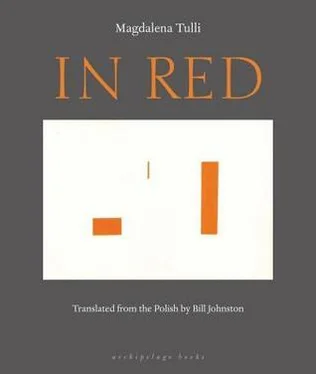Magdalena Tulli - In Red
Здесь есть возможность читать онлайн «Magdalena Tulli - In Red» весь текст электронной книги совершенно бесплатно (целиком полную версию без сокращений). В некоторых случаях можно слушать аудио, скачать через торрент в формате fb2 и присутствует краткое содержание. Год выпуска: 2011, Издательство: Archipelago Books, Жанр: Современная проза, на английском языке. Описание произведения, (предисловие) а так же отзывы посетителей доступны на портале библиотеки ЛибКат.
- Название:In Red
- Автор:
- Издательство:Archipelago Books
- Жанр:
- Год:2011
- ISBN:нет данных
- Рейтинг книги:3 / 5. Голосов: 1
-
Избранное:Добавить в избранное
- Отзывы:
-
Ваша оценка:
- 60
- 1
- 2
- 3
- 4
- 5
In Red: краткое содержание, описание и аннотация
Предлагаем к чтению аннотацию, описание, краткое содержание или предисловие (зависит от того, что написал сам автор книги «In Red»). Если вы не нашли необходимую информацию о книге — напишите в комментариях, мы постараемся отыскать её.
In this inventive novel, Magdalena Tulli creates a world that is unreal, yet strangely familiar and utterly convincing. Set in a mythical fourth partition of Poland,
is full of haunting descriptions of the town and its inhabitants; its power lies in Tulli's evocative, almost hallucinatory use of language.
In Red — читать онлайн бесплатно полную книгу (весь текст) целиком
Ниже представлен текст книги, разбитый по страницам. Система сохранения места последней прочитанной страницы, позволяет с удобством читать онлайн бесплатно книгу «In Red», без необходимости каждый раз заново искать на чём Вы остановились. Поставьте закладку, и сможете в любой момент перейти на страницу, на которой закончили чтение.
Интервал:
Закладка:
“There has to be a will somewhere,” people kept repeating.
In the feverish search someone broke the bottle that had been handed down by the first of the Looms, inside which for generations an English galleon had been sailing the high seas full sail, driven by gusts of desire and greed. The Looms has gotten used to the idea that their life did not end: so long as it had been possible, at the appropriate moment each of them had been able to replace his predecessor unobtrusively, and so they were not in the habit of leaving wills, let alone bequests to the town, which they regarded as their own property in its entirety, from the heaps of snow lining the streets to the golden gleam of the weathercock on the town hall tower.
The English galleon ran aground with shattered masts on the shallows of the floor and saved Stitchings. For where else could the ocean, salty as tears, have come from to fill the invisible channels of turnover to the benefit of trade and commerce, if not from that accidentally broken bottle?
ANYONE WHO MAKES IT TO STITCHINGS APPRECIATES ITS promising misty grayness and the moist warm breeze in which desires flourish so handsomely. A wide choice of furnished rooms with all modern conveniences, and homemade meals available just around the corner, cheap and filling. Daybreaks and sunsets at fixed times. A moderate climate, flowers throughout the year. It’s well worth making the long steamboat journey, putting up with seasickness, till the port of Stitchings comes into view crowded with freighters flying various flags. Or for the same number of days rattling along in a train, dozing from tedium, rocking to the rhythmic clatter of the wheels. The visitor — for instance a traveling salesman with a valise bursting at the seams, as if instead of a few samples he had stuffed it with all of his possessions — can choose to come by land or by sea, restricted only by the properties of the place from which he sets out. But his choice of route determines the fate that awaits him upon his arrival.
Those who chose the train emerged from the station directly onto Coal Street, where there was a crush of wagons carrying their loads of coke over the cobblestones. The two chimneys of the power station filled the sky with smoke, whose swirling substance was reflected in black puddles. New arrivals would look down the streets with their coating of ash, and frown, as if in the first moment they wished to say that this was not what they were after, and that the arduous journey had been in vain. There was no sign of a dorozhka. Street urchins loitered among the travelers, picking up cigarette butts. At an opportune moment one of them would suddenly grab some piece of luggage and run away with it across the mounds of coal and heaps of planking.
“Help! My valise!” the victim would want to shout, but his cry would be cut off by fear like a knife to the throat.
Those arriving by sea would pass through the gateway of the harbor into Salt Street, where amid a perfect harmony of every possible shade of gray, people in caps pulled down over their eyes would be creeping along before vanishing into dark entranceways at the back of insurance firms, maritime trade offices, and shipping companies. The façades of these establishments, faced in gray sandstone and bearing engraved silver signboards, promised reliable professional service with a two-hundred-year-old tradition, discretion, and the hush of interiors with bulky desks, models of sailing ships, faded astronomical maps in oak frames, and collections of sextants displayed in glass cases. At the sight of such venerable buildings the traveler would rub his hands contentedly, convinced he had found himself in the right place at the right time. Filled with hope, he would flag down a dorozhka — five shining black cabs would vie for the fare — and be taken to the Hotel Angleterre, quite unaware that he’d already been relieved of his wallet.
Over the tower of the town hall a star of good fortune twinkled every night, almost able to fit into the gaping beak of the golden weathercock. The cock, itself cut out of a flat sheet of metal, would sooner or later have swallowed the star had the two not been permanently attached by an unseen wire. The unchanging order of this constellation inspired faith in the permanence of the boom, encouraging long-term enterprises and investment in real estate. Every transaction, giving birth to new desires, strengthened the perpetual illusion that the esophagus leads directly to the stomach and that possession is possible.
Across a boundless plain, in a first-class passenger car, wrapped in a weather-beaten greatcoat, Felek Chmura returned from the war. Outside the station he was beset by his ragged pals from the old days.
“That’s Felek Chmura, all in one piece! He’s a charmed one, he is!” they exclaimed, clapping him on the shoulder till one of them spotted something red under his collar. “What’ve you got there? Blood?” But Felek Chmura brushed off the scrap of silk embroidery thread. The wind snatched up the thread and carried it halfway across the town. It fell at the feet of Stefania Neumann as she was hurrying to the haberdasher’s. She tripped on the level sidewalk.
“I don’t know what’s wrong with me,” she said to the maid carrying her basket. “My head is splitting. Let’s go home.”
Felek paid for his hotel room in advance: he had a wad of banknotes in his pocket. The bellhop carried four immense burlap sacks and an officer’s trunk up to the second floor, where he had the best room in the hotel, with a view of the town hall.
Through the keyhole Felek was observed tossing his old foot-cloths into the stove and taking a pair of silk socks from one of the sacks. He exchanged his faded uniform for a dark jacket. He fastened a watch chain to the pocket of his vest, looked out the window and set the watch by the clock on the tower, at the exact moment when Oswald Slotzki was rounding the town hall, slumped in a dorozhka next to a pile of leather suitcases.
Slotzki had arrived by sea to rescue Strobbel’s works. His ears still rang with the crash of cannon fire and the sound of bugles. He cared little for porcelain, but he had a duty to help his uncle, who before the war had paid for his education. Covered in scars bright as flames, he gazed through lashless eyelids at the tower with its golden weathercock and with a blotched hand reached into his pocket for his watch.
“Your clock is five minutes slow,” he remarked sourly to the driver, who responded by lashing the horses. Slotzki got his five minutes back before the dorozhka pulled up on the muddy, rutted square in front of Strobbel’s porcelain factory. That very afternoon he was shown the shops to which he had traveled in such haste; they stood there empty, mold-infested, swathed to the ceiling in cobwebs, water pooling on the floor. He was introduced in turn to every one of the clerks: fat ones and thin ones, in discolored shirts and frock coats so worn that they shone, with perspiration dotting their balding foreheads. Slotzki shook many hands, and when it was all finally over, with a frown on his face he spent a long time washing the invisible dirt of the world off his hands. As he did so he thought about the wallet that had been stolen the moment he set foot on dry land. Finally he ordered a tankard of beer to be brought to Strobbel’s study.
“You know the firestorm I went through in the war, uncle,” he said, his mustache coated with foam. “Fire burns, but it also purifies. Unlike you, I’d rather deal with live fire than with the stagnant waters of thievery and idleness.”
The next day he sat down to study the books of income and expenditure, the yellowed invoices and the old business letters, amid all the intricacies tracing the long-standing negligence of the factory bookkeepers. He sweated, his neck reddening. He cast off his jacket, revealing field-gray suspenders. Successive days went by as he rummaged among the papers. The tangled trail of gaps in the documentation led him to prewar times, to consignments of goods that had later been turned into the shattered wares lying throughout the streets of the town, and he uncovered reprehensible errors in the procedure for purchasing the clay that the porcelain used to be fired from.
Читать дальшеИнтервал:
Закладка:
Похожие книги на «In Red»
Представляем Вашему вниманию похожие книги на «In Red» списком для выбора. Мы отобрали схожую по названию и смыслу литературу в надежде предоставить читателям больше вариантов отыскать новые, интересные, ещё непрочитанные произведения.
Обсуждение, отзывы о книге «In Red» и просто собственные мнения читателей. Оставьте ваши комментарии, напишите, что Вы думаете о произведении, его смысле или главных героях. Укажите что конкретно понравилось, а что нет, и почему Вы так считаете.












